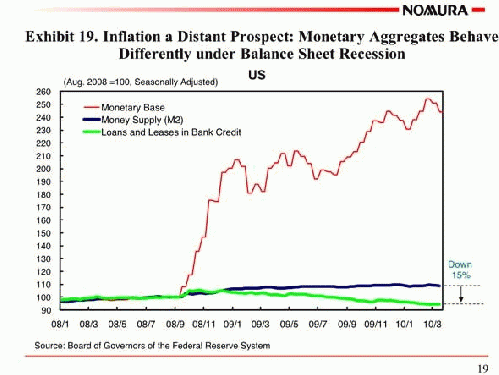The biggest drawback to the plan, says Gandel, is just that it "looks bad." It looks as if the government is paying off its debts by printing money. But that is what government-issued money is: a note acknowledging a debt due and owed from the public, good for an equivalent value from the public, traded in the marketplace. A U.S. Note or Greenback and a Federal Reserve Note or dollar bill are both forms of promissory notes. The government can as easily issue a dollar bill as a dollar note or a dollar bond, as Thomas Edison pointed out in the 1920s.
The objection to that solution is that it would be inflationary, but as economist Richard Koo graphically demonstrates, the Fed's quantitative easing has had virtually no inflationary effect on the money supply to date:
Misdirected Fed policy has instead caused $1.6 trillion in "excess reserves" to sit on bank balance sheets, as explained in an earlier article. Conveniently, excess reserves can be used as collateral for futures and derivatives contracts, and that is what some banks appear to be doing with the money: backing trades in the financial markets. This sort of speculation, involving money making money without increasing productivity, can and does drive up prices.
If the money had been delivered directly to the government to be spent on the national budget, it might have gotten into the real economy where it could do some good. The government's budget is spent not on speculation but on goods and services. Increased government "demand" stimulates an increase in "supply," causing supply and demand to increase together, avoiding price inflation while stimulating economic activity.
Time to Close the Debt Ceiling Loophole
The debt crisis was created, not by a social safety net bought and paid for by the taxpayers, but by a banking system taken over by Wall Street gamblers. The gamblers lost their bets and were bailed out at the expense of the taxpayers; and if anyone should be held to account, it is these gamblers.
The debt ceiling crisis is a manufactured one, engineered to extort concessions that will lock the middle class in debt peonage for decades to come. Congress is empowered by the Constitution to issue the money it needs to pay its debts. Abraham Lincoln did it; Barack Obama could do it. He probably won't, but he does need to follow his Constitutional mandate to pay the government's bills as and when due. The statute imposing a ceiling on the national debt is trumped by the Fourteenth Amendment, making it redundant and unnecessary. The statute should be repealed.
(Note: You can view every article as one long page if you sign up as an Advocate Member, or higher).






